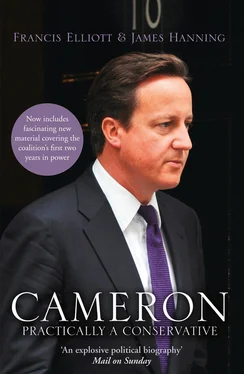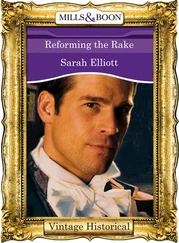Cameron
The Rise of the New Conservative
Francis Elliott & James Hanning
 London, New York, Toronto, Sydney and New Delhi
London, New York, Toronto, Sydney and New Delhi
To Jane and Emma
Cover Page
Title Page Cameron The Rise of the New Conservative Francis Elliott & James Hanning London, New York, Toronto, Sydney and New Delhi
Dedication To Jane and Emma
Peasemore A Berkshire Boyhood 1966–1973
Heatherdown Prep school 1974–1979
Eton Public school 1979–1984
Oxford University 1985–1988
Smith Square Conservative Research Department 1988–1992
Gayfere Street General election campaign 1992
11 Downing Street Treasury 1992–1993
Tuscany Romance 1992
Queen Anne’S Gate Home Office 1993–1994
St George Street Carlton Communications 1994–1997
Knightsbridge Carlton Communications 1997–2001
Witney Member of Parliament 2001–2003
Ivan Firstborn
Finstock Road Preparing for the election 2003–2005
Blackpool Leadership election 2005
Norman Shaw South Leader of the Opposition 2005–2007
Millbank Leader of the Opposition 2007–
Epilogue
Notes
Index
Acknowledgements
About the Author
Praise
Copyright
About the Publisher
PEASEMORE A Berkshire boyhood 1966–1973
‘So let a message go out from this conference.’ David Cameron paused, letting his audience know that he was building towards a dramatic conclusion. ‘A modern compassionate Conservatism is right for our times, right for our party – and right for our country. If we go for it, if we seize it, if we fight for it with every ounce of passion, vigour and energy from now until the next election, nothing and no one can stop us.’
For a moment the Empress Ballroom in Blackpool’s Winter Gardens seemed bleached out by the photographers’ xenon flashes rippling round the hall as if synchronised with the sudden roar of approval. The applause intensified when the candidate was joined on stage by his wife Samantha, then pregnant with the couple’s third child. Her pregnancy gave the photographers a powerful image to illustrate his message that the time had arrived for a ‘new generation of Conservatives’. The cheering delegates may not have known that that line owed a good deal to John F. Kennedy. But they believed that the Tories had found their own young saviour.
Cameron’s speech to the Conservative Party conference on 4 October 2005 launched him into public consciousness and set him on course for victory in the party’s leadership election. Its success took almost everyone by surprise. Even his most senior allies had not realised until a few days before how charismatic he could be. Indeed there had been some discussion about whether he should pull out of the race and declare his support for David Davis, who was then the firm favourite. But Cameron wanted a chance to perform on what was, at that point, the biggest stage of his career. He was confident that he could deliver a powerful speech. The newspaper headlines on 5 October confirmed that he was right. It turned out to be a speech of such momentum-creating power as to carry him over the finishing line a winner.
Reflecting on his sudden burst from the rear of the leadership field to its front, a former colleague said: ‘Like all political overnight sensations, it was twenty years in the making.’ This is the story of the making of David Cameron – of how, as one of his friends put it, Cameron climbed ‘floor by floor’ to the top of the Conservative Party. It was an ascent achieved by hard work and intelligence, but it also benefited from luck and the efforts of others. This is the story, too, of a childhood spent in an England that barely exists any more. Cameron’s was a world first of nannies and matrons, then of beaks and boys’ maids. But his privilege is peculiar not so much for its material as for its emotional wealth. He likes to say that he is an optimist, and the man whom he credits with instilling in him that quality is his father.
David Cameron’s great-great-grandfather Ewen left Scotland early in Queen Victoria’s reign and started his business career, in the mid-nineteenth century, in the Far East, working for the Hong Kong Shanghai Bank. Having become a director, he eventually returned to London to manage the bank, and was knighted for his services. His son, David Cameron’s great-grandfather, was Ewen Alan Cameron, who rose to become senior partner of stockbrokers Panmure Gordon. He lived partly at Blairmore Castle, near Huntly in Aberdeenshire (originally a family home of his wife, Rachel Geddes) and partly in London. They had four children, one of whom was Donald Cameron, born in 1906. At the age of twenty-six, Donald – who followed his father in becoming a partner of Panmure Gordon – married Enid Agnes Maud Levita. Two years later, on 12 October 1932, when they were living at 25 Chesham Street, SW1, their only son Ian was born.
The bald facts of Ian Cameron’s early life might not be expected to encourage the development of a positive outlook. In the language of the day he was born a cripple, his legs severely deformed from the knees downwards. A bout of German measles during his mother’s confinement was blamed, incorrectly, at the time, but the cause remains obscure. Its effect was to shorten his legs below the knee and twist his feet, one of which had three toes, the other four. He had a series of operations in very early infancy to provide some relief to the problem – although after the age of three he was never particularly in pain – and straighten his legs, but while the rest of him suggests a man of about six foot two, he is actually about a foot shorter than that.
The young Ian was sent away to boarding school, wearing specially adapted shoes. He went first to Betteshanger School in Kent, where, because of his disability, he was made to have an extra hour’s rest every day. At home, in London during the holidays, his mother treated him with a great deal of affection but also with some firmness. She believed that the effect of his disability had to be minimised, that he had to do as much as possible for himself. Friends say it was from her that he acquired much of his tough-mindedness and independence. To this day he feels in her debt for pushing him beyond what, at the time, he thought he was physically capable of doing.
By the time Ian Cameron was preparing to go to Eton he suffered another blow – his father left his mother and married an aristocratic Austrian. Marielen von Meiss-Teuffen had been born in 1918 in Attersee near Linz, Austria, and was sent, while still a teenager, first to France and then to Britain. When she met Donald Cameron in wartime London, she was working as an announcer for the BBC having already divorced her first husband Reginald Critchley, with whom she had had a daughter, Verena. Now in her late eighties and living in a nursing home in Vienna, Marielen says that at first Enid Cameron was friendly and ‘didn’t mind me being around’. When the exact nature of her husband’s relationship with her was revealed it was clearly a painful shock. ‘You can imagine what the woman must have felt to realise her husband was in love with another woman.’ While Donald Cameron and his new wife set up home in Clareville Grove, Kensington, his son was left to support his mother. It was a lonely, difficult and formative time for Ian Cameron.
The failure of Enid Levita’s marriage may have prompted her to reflect on the shame of her grandmother, Lady Agnes Duff, who was shunned in society following two elopements and a divorce. Agnes, David Cameron’s forebear, eventually took refuge in nursing. It was there that she met and married Dr Alfred Cooper, a specialist in sexual ailments. (Cooper used to claim that between them he and his wife were acquainted with the private parts of all the peers in London.) Agnes’s parents were the 5th Earl of Fife and Lady Agnes Hay, but her most noteworthy relative from the more recent past was one of her four children, Duff Cooper, who became Sir Winston Churchill’s Minister of Information during the Second World War and whose beautiful wife Diana aroused such admiration. The philandering Duff Cooper was thus Ian Cameron’s great-uncle (although they never met). He was also, like Ian Cameron, a chairman of White’s, the men-only club in St James’s. David Cameron has expressed relief that he has not inherited Duff Cooper’s remarkable appetite for wine and women.
Читать дальше

 London, New York, Toronto, Sydney and New Delhi
London, New York, Toronto, Sydney and New Delhi










